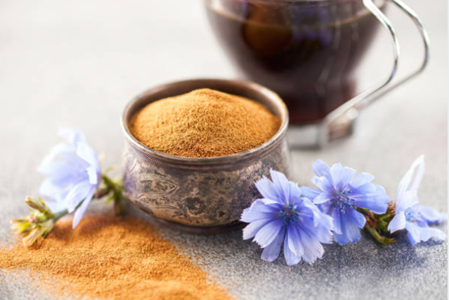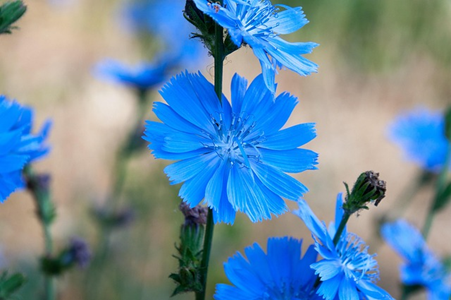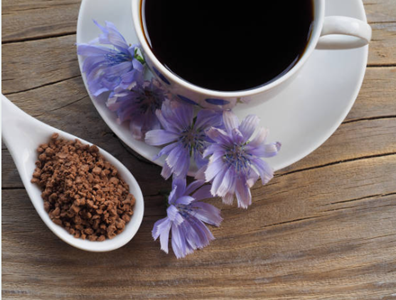Chicory coffee is a caffeine-free drink made from the roasted and ground roots of the chicory plant. Chicory is brewed just like regular coffee, and it has a similar rich, slightly bitter taste, though it’s a bit earthier and nuttier. You’ll find chicory coffee popular in places like New Orleans, where they often mix it with regular coffee.
Chicory coffee has quite a story behind it. People have been drinking it for centuries, especially when real coffee was hard to find or too expensive. It became famous in New Orleans and still holds a special place there today.

In this blog, you’ll find out what chicory is, how it tastes, a bit of its history, its health benefits, and how to brew it at home—super easy!
What is Chicory Coffee?
Chicory coffee is a drink produced from the roasted ground root of the chicory plant (Cichorium intybus). This plant is part of the dandelion family and grows bright blue flowers. It’s often found in Europe, North America, and Australia.

Instead of using coffee beans, chicory coffee uses the root of the chicory plant. The root is cleaned, chopped, and roasted until it’s dark brown and then ground, just like coffee beans. Once brewed, it resembles regular coffee in appearance and taste, but has a unique, earthy flavor.
You can drink chicory coffee on its own as a caffeine-free alternative. Or, you can blend it with regular coffee grounds. This mix gives your cup a fuller flavor and reduces the caffeine content — perfect if you’re trying to cut back on coffee but still want the taste.
Chicory coffee is especially popular in places like New Orleans, where it’s part of the local coffee culture. However, it’s gaining popularity around the world due to its health benefits and bold flavor.
How to Make Chicory Coffee?
Making chicory coffee is simple and can be done in many ways, depending on your choice. Here’s a simple recipe to prepare New Orleans Style Chicory Coffee at home:
Ingredients:
- Roasted Chicory grounds
- Regular ground Coffee
- 1 cup of water
Step 1: Get Your Chicory
You can buy roasted chicory root from most grocery stores or online. It usually comes ground, just like coffee. If it’s not ground, you’ll need to grind it yourself—medium to fine grind works best.
Step 2: Decide on the Ratio
You can brew it on its own or mix it with coffee. A common blend is:
- 70% coffee / 30% chicory for a milder start
- Or go 50/50 if you want more of that bold chicory flavor
- You can also go 100% chicory if you’re avoiding caffeine completely
Step 3: Boil the Water
Heat your water to about 200°F. Don’t let it reach a rolling boil – you want it just hot enough to see small bubbles forming.
Step 4: Brew Your Coffee
You can brew chicory coffee just like regular coffee. Here are a few easy ways:
- French Press: Add your chicory or chicory/coffee mix, pour in hot water, stir, steep for 4 minutes, then press.
- Drip Machine: Use a regular coffee maker and filter, just like brewing ground coffee.
- Stovetop (New Orleans-style): Simmer chicory and water together in a pot for a few minutes, then strain.
Step 5: Taste and Adjust
Take a sip and see how you like it. Chicory has a strong, earthy flavor—kind of like coffee, but with a hint of sweetness and spice. If it’s too strong, add a bit more hot water or milk.
Tip: Start with a 50:50 blend of coffee and chicory. Change the ratio depending on how strong or mild you like it.

What Does Chicory Coffee Taste Like?
Chicory coffee has a rich, earthy taste with a hint of nuttiness. You’ll notice it’s rich and full-bodied, just like a good cup of joe, but it has a distinctly woody flavor that sets it apart. Chicory coffee is naturally less acidic than regular coffee, so it won’t give you that sharp bite or upset your stomach. Instead, it goes down easy and mellow.
I find it smoother than regular coffee and a little less bitter. If you enjoy dark roasts, you’ll probably like chicory coffee.
Does Chicory Coffee have Caffeine?
No, chicory doesn’t have caffeine. That’s one of its biggest selling points – you get that rich, coffee-like taste without any caffeine at all.
If you buy a chicory-coffee blend (which is pretty common), that will have caffeine because it contains actual coffee beans mixed with the chicory root. The amount of caffeine depends on the ratio – more coffee means more caffeine, more chicory means less.
What are the Benefits of Chicory Coffee?
1. Provides several nutrients
Chicory root is a notable source of inulin, a prebiotic fiber that supports digestive health. Also, it contains essential nutrients such as Vitamin C, Vitamin B6, Manganese, Fatty acids, Selenium, Potassium, Calcium, Phosphorus, Magnesium, and Folate [1].
2. Improve Digestive Health
The inulin in chicory root functions as a prebiotic fiber, boosting the growth of beneficial gut bacteria. This supports a healthy gut microbiome, aids digestion, and can help prevent constipation.
3. Lower Blood Sugar
Chicory root contains inulin, a fiber that helps manage blood sugar levels by improving how your body processes carbohydrates and reducing insulin resistance. Studies show that inulin supplements can benefit people with prediabetes and type 2 diabetes by making insulin work more effectively in the body [2].
4. Decrease inflammation
Animal studies suggest chicory root has anti-inflammatory effects, reducing key inflammation markers like tumor necrosis factor alpha and interleukins. Additionally, chicory extract has been shown to block inflammation pathways in rats with gout [3].
What are the Side Effects of Chicory Coffee?
While chicory coffee is generally safe for most people, it may not be suitable for everyone. Possible side effects include:
- Allergic reactions in individuals sensitive to ragweed or birch pollen.
- Digestive discomfort such as gas or bloating, especially when first introducing inulin.
- Chicory root may stimulate menstruation or uterine contractions. Pregnant women should avoid it unless approved by a doctor.
Always consult your healthcare provider if you have health conditions or are taking medication.
What is the History of Chicory Coffee?
Chicory coffee may sound trendy today, but its roots go back centuries. It has a fascinating story tied to both survival and tradition, stretching from Europe to the heart of New Orleans.
Origins: From Medicinal Herb to Coffee Substitute
Chicory (Cichorium intybus) is a blue-flowered plant that has been growing in Europe since ancient times. Early civilizations, like the Egyptians and Romans, used chicory root for its medicinal properties. They believed it could purify the liver and help with digestion. Even in the Middle Ages, herbalists in Europe recommended chicory for various ailments, especially stomach issues and liver problems. But it wasn’t just a healing herb.
By the late 17th and 18th centuries, people in France discovered a new use for chicory root—as a coffee extender and substitute. This change came out of necessity. During economic crises and wartime shortages, coffee became either too expensive or unavailable. Roasted and ground chicory root offered a similar deep, roasted flavor without caffeine, and it was much cheaper.
Chicory coffee became especially popular during Napoleon’s Continental Blockade (early 1800s), which cut off British coffee imports. French citizens began blending chicory with coffee or drinking it on its own. Even when coffee became available again, many people developed a taste for this earthy brew.
New Orleans: The Heart of Chicory Coffee in America
The story of chicory coffee took a new turn during the American Civil War (1861–1865) [4].
At that time, the port of New Orleans was cut off from regular trade routes. Coffee was in short supply, and locals needed an alternative. Inspired by the French tradition, they began roasting and grinding chicory roots to mix with coffee or brew alone. It wasn’t just a quick fix—it became a cultural staple.
Even after the war ended and coffee supplies returned, the tradition of chicory coffee stuck. Why? People in New Orleans genuinely loved the flavor-rich, bold, with a slightly woody sweetness. It paired perfectly with milk, and the classic café au lait (half chicory coffee, half hot milk) became the go-to morning drink for many.
Today, chicory coffee is an iconic part of New Orleans culture. It’s more than just a beverage—it’s history in a cup.
What are the Best Chicory Coffee Brands?
Looking to try chicory coffee? Here are some famous and highly rated options:
1. Café du Monde Coffee and Chicory:
This legendary New Orleans brand has been serving its signature coffee and chicory blend since 1862. Their dark roast coffee-chicory combination delivers that authentic Louisiana flavor that locals have loved for generations. You can enjoy it black for a bold experience or “au lait” style with steamed milk for a creamier, more mellow cup that pairs beautifully with sweet pastries.
2. Anthony’s Organic Roasted Chicory Root
Anthony delivers premium organic chicory root without any coffee mixed in. This gives you the flexibility to create your own custom blends or enjoy chicory coffee in its purest, completely caffeine-free form.
Check out Related Coffee Drinks
FAQs
Does Chicory Make Coffee Stronger?
Yes, chicory adds a deeper, roasted flavor to coffee, which some may perceive as stronger. However, it does not contain caffeine, so it’s not stronger regarding stimulation.
Can you drink chicory coffee every day?
Yes, many people enjoy chicory coffee daily. In moderate amounts, it’s safe for most people. Remember possible side effects if you’re new to inulin or have allergies.
Reference:



